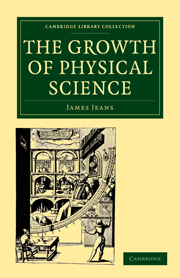Book contents
- Frontmatter
- PUBLISHERS' NOTE TO THE SECOND EDITION
- PREFACE
- Contents
- PLATES
- I THE REMOTE BEGINNINGS
- II IONIA AND EARLY GREECE
- III SCIENCE IN ALEXANDRIA
- IV SCIENCE IN THE DARK AGES
- V THE BIRTH OF MODERN SCIENCE
- VI THE CENTURY OF GENIUS
- VII THE TWO CENTURIES AFTER NEWTON
- VIII THE ERA OF MODERN PHYSICS
- Index
- Plate section
II - IONIA AND EARLY GREECE
Published online by Cambridge University Press: 07 September 2010
- Frontmatter
- PUBLISHERS' NOTE TO THE SECOND EDITION
- PREFACE
- Contents
- PLATES
- I THE REMOTE BEGINNINGS
- II IONIA AND EARLY GREECE
- III SCIENCE IN ALEXANDRIA
- IV SCIENCE IN THE DARK AGES
- V THE BIRTH OF MODERN SCIENCE
- VI THE CENTURY OF GENIUS
- VII THE TWO CENTURIES AFTER NEWTON
- VIII THE ERA OF MODERN PHYSICS
- Index
- Plate section
Summary
In the present chapter we examine the first three centuries of Greek scientific progress; our period begins with the earliest impact of oriental scientific ideas on Ionian Greece, and ends with the conquest of Greece by Alexander the Great (332 b.c.), the death of Aristotle (322 b.c.), a general decline of science and art in Greece, and the foundation of the City of Alexandria and of its university (323 b.c.), which was to be the intellectual centre of the world for many generations to come. In brief, we study Greek science in the period of Greece's intellectual greatness.
This science was almost entirely mathematical. The Greeks had nothing of our elaborate equipment of laboratories and observatories. Indeed, their equipment was limited to their own brains, but these were of the very best; just as Aeschylus and Sophocles exhibit mental powers comparable with those of Shakespeare, so Archimedes and Aristarchus exhibit powers comparable with those of Newton. Thus they could attack their various problems only by reflection and contemplation, aided at most by a minimum of observation, and when physics and astronomy creep in, it is in the form of philosophical speculation rather than of true science as we understand it to-day.
It will be convenient to discuss the early Greek mathematics, physics and astronomy separately, and in this order.
- Type
- Chapter
- Information
- The Growth of Physical Science , pp. 18 - 68Publisher: Cambridge University PressPrint publication year: 2009First published in: 1947



